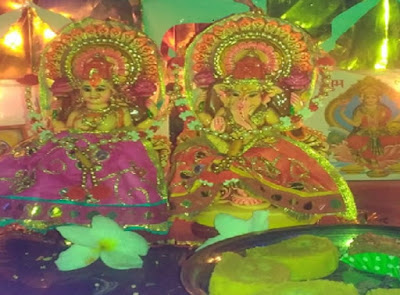Lakshmi Puja is performed on Diwali, the Festival of Lights, for several reasons deeply rooted in Hindu mythology and tradition:
Goddess of Wealth and Prosperity:
As we know, Goddess Lakshmi is considered the goddess of wealth, prosperity, and abundance in Hinduism. Her worship on Diwali is believed to bring financial success, good fortune, and prosperity to households. People seek her blessings for material well-being and economic stability.
Celebration of the Return of Lord Rama:
Diwali marks the return of Lord Rama, along with his wife Sita and loyal companion Lakshmana, to Ayodhya after defeating the demon king Ravana. The people of Ayodhya welcomed them by lighting oil lamps, and this tradition has continued as a symbol of the victory of light over darkness. Worshiping Lakshmi on Diwali is seen as invoking her presence to bless the home and bring prosperity, echoing the joyous return of Lord Rama.
Why we worship Lord Ganesha with Lord Lakshmi on Diwali?
Association with Vishnu:
Lakshmi is often regarded as the consort of Lord Vishnu, one of the principal deities in Hinduism. Diwali is considered auspicious for worshiping Vishnu, and Lakshmi is invoked to bring blessings and grace into the homes of devotees.
Harvest Festival Connection:
In some regions of India, Diwali is celebrated as a harvest festival. The bounty from the harvest is celebrated, and people seek the blessings of Goddess Lakshmi for a fruitful and prosperous year ahead. This aspect of Diwali as a harvest festival is particularly significant in agricultural communities.
Business and Trade:
Diwali is also considered the beginning of the financial year in traditional Hindu business communities. Business owners and traders perform Lakshmi Puja seeking the goddess's blessings for a successful and prosperous year in their commercial endeavors.
Symbol of Purity and Light:
Lakshmi is associated with purity and light. Her presence is believed to dispel darkness and ignorance, both metaphorically and literally. Lighting lamps and diyas during Diwali symbolize the removal of spiritual darkness and the triumph of knowledge over ignorance.
Custom of Giving and Receiving Gifts:
Diwali is a time when people exchange gifts and sweets as a gesture of goodwill. Worshiping Lakshmi is believed to enhance the positive energy in homes, promoting generosity and kindness among individuals.
In summary, the worship of Goddess Lakshmi on Diwali is a multi-faceted tradition that encompasses aspects of material prosperity, spiritual well-being, and the celebration of the triumph of good over evil. It is a time for families to come together, express gratitude, and seek the blessings of wealth and abundance for the coming year.
Know the diffference between Deepavali and Diwali
Deepavali and Diwali are the same festival which is commonly known as festival of Light. In fact just there is a difference between spellings both the words with central idea is same like Deepawali.
Diwali: This is the most common spelling of the festival and is widely used in India and around the world. The word "Diwali" comes from the Sanskrit word "Deepavali," which means "rows of lighted lamps." Deepawali: This spelling is less commonly used than "Diwali" but is still considered correct.
It is the same festival with a spelling difference. Etymologically, Deepavali is a Sanskrit word meaning row of lamps. Diwali is a corrupted form of Deepavali used in Northern states of India. Interestingly, South Indian and east Indian states use the etymologically correct name, Deepavali.


Post a Comment